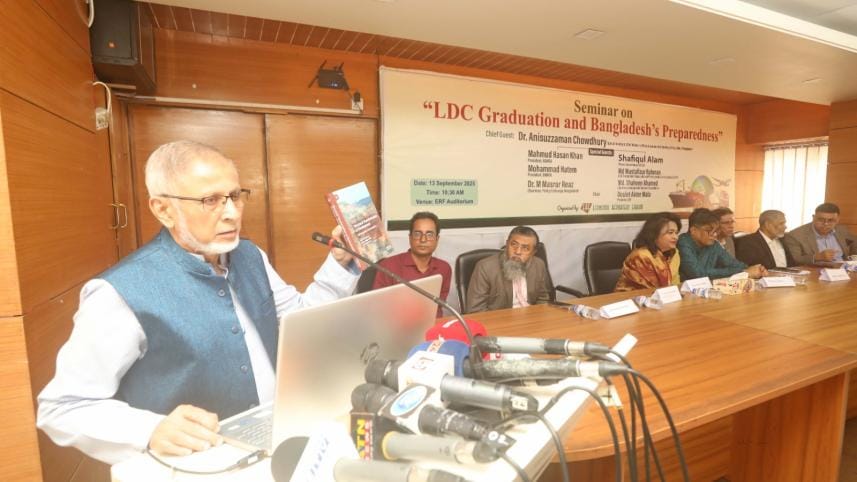Delaying LDC graduation not fully in govt’s hands

Delaying Bangladesh's graduation from the least developed country (LDC) status is not entirely within the government's control, as the country is firmly set to graduate by November 2026, said Anisuzzaman Chowdhury, special assistant to the chief adviser.
"If Bangladesh seeks deferral, it would require approval from the majority of member states of the United Nations, which is unlikely as we've already met all three graduation criteria," said Chowdhury, also emeritus professor at Western Sydney University and former UN-ESCAP director.
Speaking at a seminar hosted by the Economic Reporters' Forum (ERF) yesterday, he compared the graduation process to a plane's take-off, comprising initial readiness, turbulence, and mid-air adjustments.
Despite Covid-19 and subsequent economic shocks, Bangladesh met the criteria in 2018, and received official UN recommendation in 2021 following a three-year review.
GDP growth fell from 7.1 percent in 2022 to 4.2 percent in 2024, inflation hit 10.5 percent, and reserves dropped from $48 billion to $26 billion.
Chowdhury blamed capital flight and macro mismanagement for the declines, citing a $234 billion outflow between 2009-2023 and the resulting $5.5 billion bailout by the International Monetary Fund (IMF).
He noted signs of recovery under a new economic team. Forex reserves rose to $31.8 billion, and garment exports to the United States and the European Union increased by 25 percent and 18 percent, respectively.
A Smooth Transition Strategy has been initiated to improve trade facilitation and logistics, he noted.
Stating that Bangladesh's gross national income stands at $2,899 and that it has stronger macro indicators than Nepal or Laos, Chowdhury said key markets like the EU, the UK, and Canada would maintain trade preferences post-2026. He expects gains in pharmaceuticals, leather, and footwear, with 85 percent of drug prices remaining stable.
"If the private sector wants a delay, it must present evidence and logic," he added.
Business leaders, however, pressed for a deferral, saying Bangladesh has much to lose if it graduates next year.
"If GSP+ rules remain unchanged, we may lose EU trade benefits," said Mohammad Hatem, president of the Bangladesh Knitwear Manufacturers and Exporters Association (BKMEA).
He urged the government to engage in meaningful dialogue with exporters and address lingering customs issues. "We need clarity on post-graduation challenges and solutions. Without it, we remain in the dark."
The BKMEA president emphasised that while other countries that graduated from LDC status in the past had little to lose, Bangladesh's export-dependent economy faces real risks.
"We have a lot at stake. If the EU doesn't reform its GSP+ rules, Bangladesh could lose preferential access after graduation," Hatem cautioned.
He also highlighted concerns over previously inflated export data, which were later corrected by the Bangladesh Bank.
"The economy was on life support under the previous government. The current administration has brought some discipline, but it needs time and our support," he said.
Inamul Huq Khan, senior vice president of the Bangladesh Garment Manufacturers and Exporters Association (BGMEA), sought a three-year extension. "We're not ready. Exporters face stricter compliance, carbon requirements, and certification costs."
He called for the immediate signing of free trade agreements, export diversification, green investment, SME support, and worker training. "Strategic retreat is not defeat. With time, we'll return stronger."
Meanwhile, Shafiqul Alam, press secretary to the chief adviser, said that the government has not changed its stance on graduation.
He warned that emotional debates often derail rational policymaking.
"Policy must be based on facts, not fear," he said, citing back-to-back LCs and readymade garment reforms as risk-driven successes.
He urged the BGMEA to invest in research and port efficiency while stressing private sector accountability to prevent disasters like Rana Plaza factory collaspe in 2013.
Policy Exchange Bangladesh Chairman M Masrur Reaz, meanwhile, said that graduation is irreversible, but timing, impact, and preparedness require data-driven dialogue.
"We are not Laos or Nepal. Our scale and vulnerabilities demand more caution," he said, citing missed reforms between the 2021-2024 period.
He urged exporters to present facts, not just demands. "Don't just ask for delay, justify it with clear reasoning."
The seminar was chaired by ERF President Doulot Akhter Mala and moderated by General Secretary Abul Kashem.



 For all latest news, follow The Daily Star's Google News channel.
For all latest news, follow The Daily Star's Google News channel.
Comments